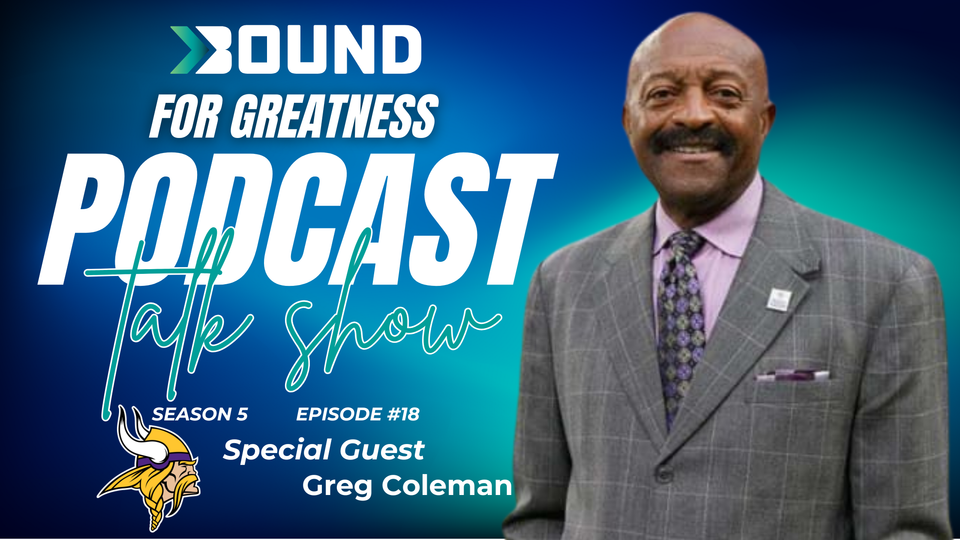Flipping the Field with Greg Coleman

How a Trailblazing NFL Punter Turned Setbacks into Setups for a Life of Leadership and Legacy
From the sweltering streets of Jacksonville, Florida, to the frozen sidelines of the old Met Stadium in Minnesota, Greg Coleman has always found a way to flip the field.
Not just with his legendary coffin-corner punts that pinned NFL opponents deep in their territory, but in life, every time adversity showed up on fourth down. The NFL’s first African-American punter didn’t just redefine special teams. He redefined what it meant to lead with faith, focus, and fortitude.
In this powerful episode of Bound for Greatness, host Scott Garvis revisits his childhood hero, and reflects on the day a gracious Coleman signed an autograph for him at Vikings training camp. Years later, Coleman returns not with cleats and shoulder pads, but with a message: your setback is your setup.
And it all starts with a bag of footballs.
The Setup: A Life Changed by a Kick
When Coleman was a high school junior, he considered himself a tough, athletic defensive end. He was racking up sacks and leading his team. But after one too many injuries, coaches had seen enough. They told him to “go grab the bag of footballs” and start punting.
“I was ticked,” Coleman admits. “I was a captain! I wanted to be on defense. But sometimes life moves you where you need to go, not where you want to go.”
He begrudgingly headed to the other side of the field, and what began as a disciplinary shift turned into a divine appointment. That detour became destiny. Coleman’s booming punts would eventually become his passport to the NFL and a 12-year career.
But it started with crushed pride and a plastic bag full of footballs.
The Blueprint of a Dream
Greg didn’t always have fancy equipment. As a kid, his first kicking tee wasn’t made of rubber, it was a crushed soda can. He booted pop cans over fences until his foot hurt. Eventually, that turned into punting Nerf balls, then real footballs across his neighborhood, over electrical wires and across rooftops.
He wasn’t the fastest. He wasn’t the biggest. But he could kick, and he knew it.
“I realized early that if I mastered this craft,” Coleman recalls, “I might be able to carve out a space for myself in a game that didn’t usually look for people who looked like me in that role.”
That space opened wider when he began watching NFL games and saw punters walk off the field with clean jerseys while the rest of the team was bloodied and muddied.
“That’s what I want to do,” he remembers thinking with a smile. “And keep my uniform clean while I’m at it.”
The Flip: From Doubt to Destiny
After college at Florida A&M and a short stint with Cleveland, Coleman was released. His dreams were dangling. On the verge of quitting, he stood at his apartment window and yelled at God, questioning His promises. Desperate, he said something he never imagined: “I’ll even play for the Minnesota Vikings.”
The next day, the phone rang.
It was the Vikings.
Ten years, a nickname ("Coffin Corner Coleman"), and countless fourth downs later, Coleman had become a Minnesota legend, redefining punting not as surrender, but as strategic repositioning.
That’s the message of his book PUNT: Flip the Field—a metaphor for life.
PUNT: The Leadership Framework
In the podcast, Coleman breaks down his personal leadership framework based on the word PUNT:
- P – Push through the obstacles: Life is full of hurdles—literally for Greg, a former track athlete. But greatness demands grit.
- U – Understand your strengths: Everyone wants to be a quarterback or wide receiver. Coleman embraced his gift and mastered it.
- N – Navigate the crap of life: Storms are guaranteed. Your job is to get through without quitting.
- T – Take calculated risks: When preparation meets opportunity, the field flips.
“You don’t pivot. You punt,” he declares. “You move the situation to gain an advantage. That’s not quitting. That’s leadership.”
It’s a framework Coleman now teaches to athletes, executives, educators, and everyday people who face fourth-down moments in life.
A Punter Who Played Both Ways
Coleman explains how a punter is both offense and defense. “When the ball is snapped, I’m offense. As soon as it leaves my foot, I’m defense.”
His job wasn’t just to kick it was to inspire. To shift momentum. To give his team a fighting chance.
And when he knocked one out at the five-yard line? “Man, the defense got jacked up,” he laughs. “They knew I had done my part. Now it was their time.”
Coleman believes coaching is the same way. “Sometimes we’ve got to turn it over to our kids and trust that they’ll handle it. But we better flip the field first.”
Inspired by Coaches, Driven by Legacy
From high school coaches like Coach Kitchens, who convinced young Greg to stop barefoot punting by reminding him that steel cleats could end his career, to college mentors like Coach KDles, who taught him to “make ‘em work for their supper,” Coleman learned the value of leadership that saw beyond the scoreboard.
“They didn’t just coach the game,” he says. “They coached life.”
These moments stayed with him, and now they shape his own mission: to be a coach, mentor, and inspiration to the next generation.
He shares how his track coach once refused to challenge an officiating error that cost Coleman a chance at state.
“He looked at me and said, ‘You’re good enough to be first. So be first.’ That stuck.”
Emotional Intelligence and Empathetic Leadership
Coleman and Garvis dig deep into the importance of emotional intelligence in leadership, what Coleman calls the “championship edge.”
“Coaches and leaders have to be more than just technical experts,” he says. “They need empathy. They need to listen. They need to serve.”
One of his mentors once told him: “If your team knows you care more about them than the spreadsheet or scoreboard, they’ll run through walls for you.”
That empathy shaped his view on coaching, corporate leadership, and family. And it’s why Coleman pushes leaders today to inspire—not just instruct.
A Legacy Rooted in Community and Faith
Coleman’s community work, from mentoring kids at the YMCA to running charity golf events, isn’t for recognition. It’s repayment.
“My coaches, my neighborhood, Scott Park, they poured into me. I have to pay it forward.” And at the core of it all? Faith. Family. Focus.
He ends the episode by quoting a poem from his late mentor, Gerald Irons:
To be the best is my quest.
Athletes come and go, but there’s something special about being a pro.
So on and on I’ll strive, keeping my championship hopes alive…
Final Whistle: Leadership Is About the Kick AND the Follow-Through
As Garvis closes the show, he reflects on a single moment of grace: a punter who took time for a wide-eyed six-year-old fan.
Now, that same punter is teaching generations how to flip the field, with their minds, their hearts, and their habits.
Whether you’re a coach, a student-athlete, or someone navigating life’s storms, Greg Coleman’s story reminds us that success isn’t just about what you do when you're on the field.
It's about how you respond when you're backed into your own end zone, and choose to flip the field.

Member discussion